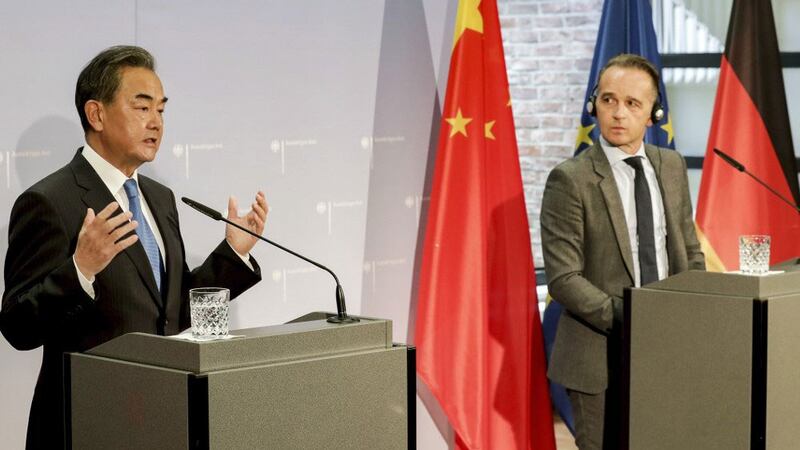Chinese Foreign Minister Wang Yi’s five-nation tour of Europe was billed as a charm offensive to court key Western nations amid a deepening China-U.S. standoff, but the trip was dogged by Taiwan, Hong Kong and Xinjiang and other issues that have straining Beijing’s ties with Washington.
Against the backdrop of street protests outside uniting exiled Hong Kong democracy activists and the Uyghur diaspora, Wang’s final stop, in Berlin, also featured confrontation with German counterpart Heiko Maas over Chinese internment camps in Xinjiang and the draconian national security law it imposed on Hong Kong.
Germany's top diplomat urged China to allow a UN mission to investigate the internment camps holding Uyghurs in the Xinjiang Uyghur Autonomous Region (XUAR) and called for the withdrawal of the national security law in Hong Kong that has led to the arrests of top pro-democracy figures, German media reported.
"We would very much welcome it if China granted an independent UN observer mission access to the camps," said Maas, adding that he had noted a "willingness to do so" on China's part, Germany’s international broadcaster Deutsche Welle (DW) reported.
Authorities in the XUAR are believed to have held up to 1.8 million Uyghurs and other Muslim minorities in a vast network of internment camps since April 2017.
Beijing describes the camps as voluntary “vocational centers,” but RFA and other media outlets shows that detainees are mostly held against their will and forced endure inhumane treatment and political indoctrination.
On Hong Kong, "We want the principle of 'one country, two systems' to be fully applied, DW quoted Maas as telling Wang on Tuesday, in reference to a sweeping national security law that bans subversion, separatism, terrorism and collusion with foreign countries.
"You know that our concerns about the effects of the security law have not been allayed," Maas said.
Maas, whose country holds the rotating presidency of the EU, also said that Europe wants the Hong Kong election this month that was postponed on purported coronavirus concerns to take place "quickly and unhindered," and said the EU should agree on a common set of sanctions in case the vote is put off.
DW reported that Wang rejected "foreign interference" in domestic affairs in the exchange at a villa on the outskirts of Berlin.
"Whether Hong Kong or Xinjiang, both fall into the category of internal Chinese matters. We do not want any foreign interference in Chinese society," Wang was quoted as saying. He had also visited Italy, France, the Netherlands and Norway.

Wang was criticized by Maas for saying the Czech Senate President Milos Vystrcil would pay a “heavy price” for his visit to Taiwan with a 90-member delegation.
“We as Europeans act in close cooperation -- we offer our international partners respect, and we expect the exact same from them,” Maas said in Berlin alongside Wang. “Threats don’t fit in here.”
The diplomatic confrontation followed a protest rally of about 100 to 150 demonstrators gathered outside the German Foreign Ministry in Berlin, uniting Hong Kong pro-democracy activists, Uyghur and Tibetan exiles and other critics and opponents of Beijing.
Prominent activist Nathan Law, who fled Hong Kong for Britain shortly after China imposed the national security law, joined hands with Dolkun Isa, president of the Munich-based World Uyghur Congress.
Hong Kong, which was guaranteed autonomy for 50 years under the "one country, two systems" deal signed before its handover from Britain in 1997.
"The authoritarian government is going the opposite way," he said.
Isa told RFA’s Uyghur Service that the WUC had rallied in Berlin to “urge the government of Germany that it cannot remain silent on the issue of China’s genocide of Uyghur people because of its trade relations with China.”
“By holding this rally in front of the German Foreign Ministry, we also urge the German government to promptly and seriously raise this issue with China to stop the ongoing Uyghur genocide,” he added.
Additional reporting and translation by Alim Seytoff for RFA’s Uyghur Service.
